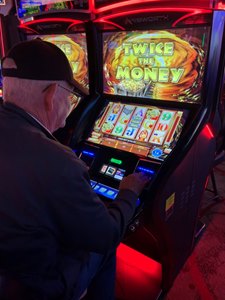Kentucky HHR Supporters Request Action From Legislators


In a line of reasoning certain to at least generate plenty of consideration from lawmakers, supporters of historical horse racing in Kentucky have informed lawmakers that thousands of high-paying jobs in the state are on the line since a 2020 state Supreme Court decision called into question the legality of the games.
In a Dec. 14 hearing before the Interim Joint Committee on Licensing, Occupations, and Administrative Regulations, horse racing industry supporters called on legislators to protect HHR, which has helped boost Kentucky racing and breeding through millions of dollars generated for purses, breeder awards, and tracks, as well as the state.
Since its initial launch at Kentucky Downs in 2011, HHR games have operated as pari-mutuel games that have helped nearly double purses from $65.3 million in 2012 to $113.6 million in 2019. But that industry success story is in jeopardy after a Sept. 24 opinion by the Kentucky Supreme Court that found at least one brand of HHR that has operated in the state is not pari-mutuel, in turn, making it not legal.
While tracks and game manufacturers have argued that the ruling doesn't apply to all brands of HHR games and that games can be updated to meet the court's standards, supporters at Monday's hearing called on action from Kentucky lawmakers to take these decisions away from the courts and protect the HHR in place. Supporters called for legislation that updates Kentucky laws, as needed, to define pari-mutuel wagering in a manner consistent with how the Kentucky Horse Racing Commission has defined such wagering for about the past decade in which HHR has been in place.
Supporters are willing to put measures in place to ensure limitations on HHR locations. They support the current status quo for HHR remaining in place, by codifying the existing regulatory limitatioins that restrict HHR to the licensed premises of a racing association and its single corresponding extension facility.
Braxton Lynch, president of the Kentucky Thoroughbred Association, outlined dozens of high-paying jobs directly or indirectly tied to the success of Kentucky racing and breeding.
"HHR is an integral part of (that success)," Lynch said. "HHR has been a catalyst for our industry, allowing our racing circuit to become competitive with others through higher purses. HHR contributed $36 million to purses in 2019 alone. Since its inception, we've been able to recruit and retain more horsemen to stay in the Commonwealth. This means larger and stronger field sizes and greater track attendance.
She said allowing the Supreme Court opinion to stand without action from the legislature would devastate racing in Kentucky.
"It would mean empty barns, empty fields, empty jobs, and less tax revenue."
Lynch went on to add that HHR ultimately benefits the many small breeders throughout the state.
"These horses are critical to our racing circuit and most vulnerable to departure to other states," Lynch said. "Looking back a decade ago, I remember our broodmares departing to Louisiana, New York, and Pennsylvania."
Doug Cauthen, chairman of the board of the Kentucky Equine Education Project—an advocate for all horse breeds in the state, echoed those remarks.
"Our request is simple. It's asking you to retain the status quo of HHR in Kentucky, which has been on solid ground and footing for a decade," Cauthen said. "It's about ensuring that one of our most impactful industries, one that's synonymous with Kentucky, can continue investing in our communities and moving Kentucky's economy forward."
With Kentucky racing facing challenges from other states that improved their purses with money from added-gaming, Cauthen outlined how HHR funds have allowed racing in the state to compete in that atmosphere. He noted how the strengthened circuit has benefited numerous jobs throughout the state as well as jobs and activity tied to non-racing breeds.
Cauthen also noted that there already are a number of jobs and businesses suffering in the state because of COVID-19 and not providing protection for HHR would only add to those woes. He also noted that HHR has generated millions of dollars for the state, which also figures to face financial challenges.
Kentucky Chamber of Commerce president and CEO Ashli Watts said the racing industry has a $5.2 billion economic impact and employs nearly 60,000 Kentuckians.
"Unfortunately the recent Kentucky Supreme Court ruling has put all this success at risk, both current and future," Watts said, noting that businesses do not want to make commitments in an unpredictable environment.
"We're counting on the General Assembly to take action so that these businesses, which are so important to the Commonwealth for our economic growth and development, are able to continue investing in Kentucky," Watts said.
Kent Ostrander, executive director of the Kentucky Family Foundation, which pursued the legal case against HHR that resulted in the Supreme Court decision earlier this year, opposed any protection for HHR.
Some of the legislators and participants were present at the Capitol Annex in Frankfort, while others participated virtually. Gov. Andy Beshear has voiced his support of continuing to allow HHR in the state.
